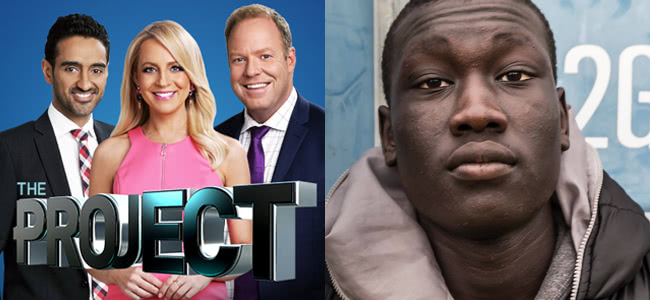Ror Akot is a Melbourne-based emcee, poet, and activist born in South Sudan, who goes by the moniker Ror Da Poet. The teenaged wordsmith was the subject of an eponymous documentary, which received acclaim at the Melbourne International Film Festival.
Way busier than we were when we were teenagers, Ror is not only a prolific musician and poet, he’s also done work with popular Channel Ten panel show The Project. However, Akot now has a bone to pick with the program following one of their recent reports.
As most readers will be aware, the past weekend saw a violent and chaotic brawl erupt on the streets of Melbourne involving members of the Apex street gang. The incident received widespread media coverage, with reports indicating more than 100 people were involved in the fight.
However, Akot was shocked when he watched The Project‘s report on the incident during their Monday, 14th March episode. Akot couldn’t help but notice that a censored and stylised image of a young South Sudanese man used during one of the shows video’s packages bared a striking resemblance to someone he knew.
“So this is what I get for being a young Blackman working hard trying to succeed?” Akot wrote on Facebook. “I’m here putting my soul into success every day trying to prove myself, not to anyone but just to me and my family.”
“I could really careless [sic] about your expectations that Australia wants Africans to be carrying on their backs within this society. As long as I have what my family needs to survive in this society, than I honestly don’t give one single flying bird about how you perceive me.”
“You could judge me, hate me, try to get rid of me. Best Believe I am not going anywhere unless I choose to, us Africans are not leaving unless we decide to leave. How are you just going to use a photo of me to support your argument??”
“Plus knowing that I did some work with you guys in the past, I am very disappointed and disgusted. Is this is how you repay me?? By trying destroy my image??” Akot goes on to address the producers of The Project directly.
“When preparing your story or ‘package’… you decided to get creative. The voiceover read ‘…the Apex gang, named after a street in Melbourne’s South East that’s grown to roughly 200 members mainly of South Sudanese background,’ and what better visuals to accompany this than a photo of a young South Sudanese man, right?”
“So you grabbed the first photo you could find… without consent from the person in question or the photographer, used the South Sudanese flag as your new background and photoshopped the person’s face in a way that perhaps you felt made him unidentifiable.”
[include_post id=”473407″]
“By this I mean placing what looks like a splash of black paint across his eyes in order to conceal his identity. Perhaps you didn’t think that with forehead, nose, mouth, ears etc visible, he would still be identifiable?”
“Or that he would then receive phone calls from friends and family telling him he’s ‘on the news’ and asking if he was involved in the weekend’s events?” Since there was ample footage of the weekend’s brawls, Akot argues there was no reason to use his likeness in the report.
Readers can check out Akot’s full post below. It’s not clear whether Akot has contacted the producers of The Project, who are yet to make a comment on the matter, directly.
So this is what I get for being a young Blackman working hard trying to succeed? I'm here putting my soul into success…
Posted by Rør Då Pœt onMonday, March 14, 2016
Ror Da Poet Photo by Justin Leijon




































